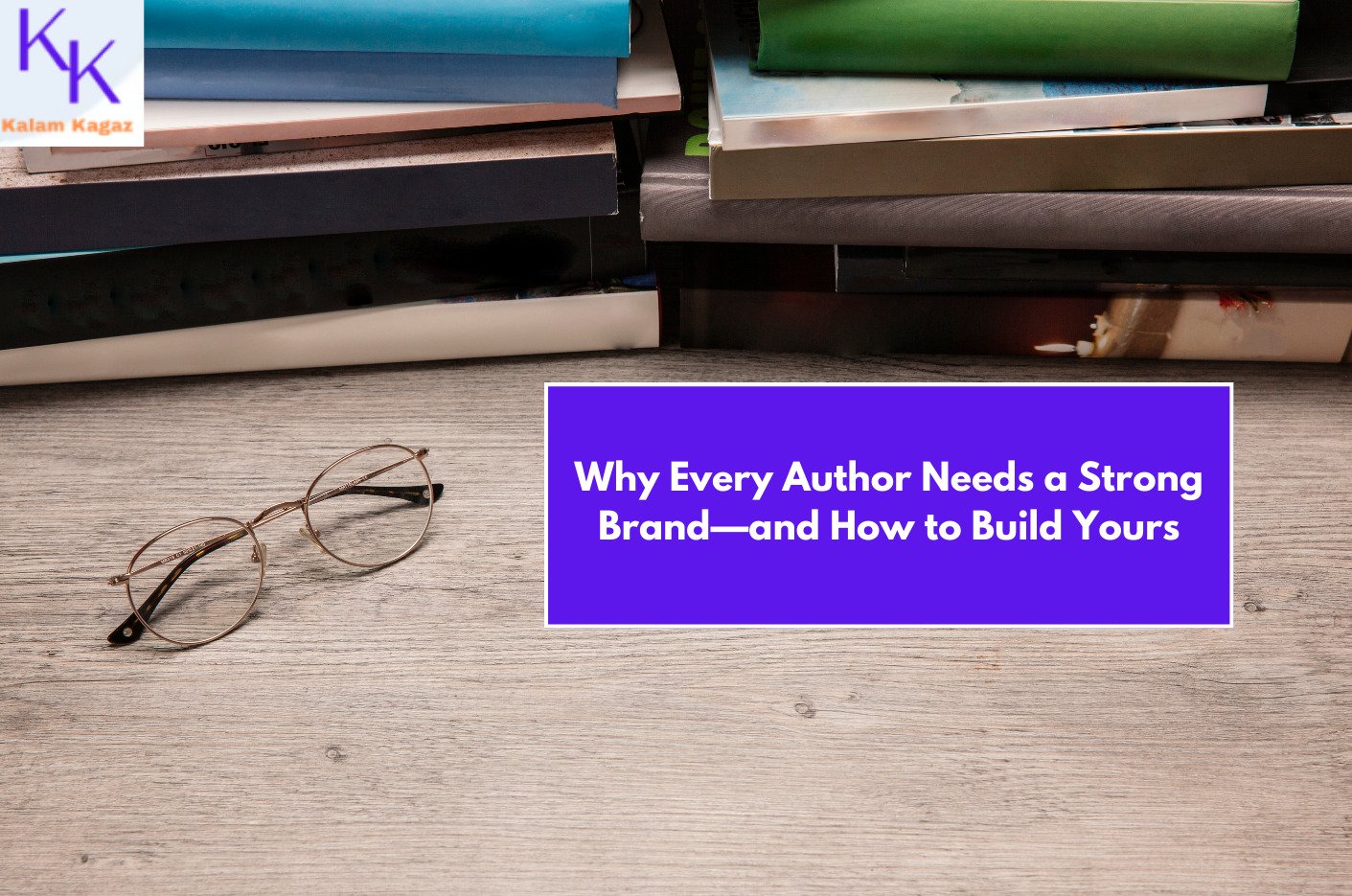- August 14, 2025
- by Kalam Kagaz
- Book Editing & Formatting, Book Marketing, book publishing
Writing a great book is only half the battle. In today’s hyper-connected, content-saturated market, the real challenge is making sure readers find your work—and remember you. With over 2 million books published annually (both traditional and self-published), relying on chance is a recipe for obscurity.
This is where author branding comes in. Your brand is not just your name and book cover—it’s the emotional connection and professional identity you build with your audience. It influences whether a reader chooses you over hundreds of other voices in your genre.
In this in-depth guide, we’ll explore why branding is critical for every author, break down its key components, and give you practical, step-by-step strategies to start building (or improving) your brand today.
The Case for Strong Author Branding
Stand Out in a Crowded Market
Imagine walking into a bookstore with thousands of titles. What makes you pick one over another? Often, it’s not just the plot—it’s the recognition and trust associated with the author’s name. A clear, unique brand ensures readers instantly understand what you offer and remember you when it’s time to choose their next read.
Example: Colleen Hoover has a consistent emotional tone and cover style that fans recognize instantly—even without reading the title.
Build Trust and Reader Loyalty
A strong author brand is a promise to your audience. When readers know what to expect—whether that’s witty banter in a romance novel or deeply researched historical fiction—they’re more likely to return for future releases. Consistency builds credibility, and credibility builds loyalty.
Increase Sales and Opportunities
Beyond readers, your brand also appeals to industry professionals—publishers, agents, event organizers, and media outlets. A polished, professional image signals that you’re serious about your career, making you a more attractive candidate for collaborations, speaking engagements, and book deals.
Core Elements of a Powerful Author Brand
Your Author Identity
Before designing logos or choosing colors, define who you are as an author:
Voice & Tone: Are you warm and conversational? Formal and academic? Playful and humorous?
Values: What themes or causes do you stand for?
Niche & Audience: Who is your ideal reader, and what do they care about?
Tip: Write a one-sentence “author mission statement” to guide all your branding decisions.
Visual Branding
Your visuals should reflect your personality and genre while appealing to your target audience.
Logo: A simple, recognizable mark (can be your signature or initials).
Color Palette: Choose 3–5 brand colors that work well in print and digital formats.
Typography: Select fonts that match your tone—serif for tradition and authority, sans-serif for modern and clean.
Pro Insight: Use your color palette not just on your website but in your book covers, social media graphics, and promotional materials to reinforce recognition.
Online Presence
Your online platforms are where your brand comes to life daily:
Author Website: Acts as your hub with your bio, books, blog, and contact info.
Social Media: Choose platforms where your audience is active (TikTok for YA, LinkedIn for business books, etc.).
Email Newsletter: Your most direct and valuable connection with readers.
Reader Experience
Branding doesn’t stop at visuals. It’s also the feeling readers get when they interact with you:
Consistent email tone and frequency.
Personal touches, like signed bookplates or behind-the-scenes updates.
A smooth, engaging buying experience.
Step-by-Step Guide to Building Your Author Brand
Step 1: Define Your Brand Vision
Identify your unique selling proposition (USP).
Clarify your long-term author goals (e.g., speaking gigs, bestseller lists, niche dominance).
Step 2: Create Visual Consistency
Use Canva, Adobe Express, or hire a designer to create a brand kit.
Apply it everywhere—from your website to event banners.
Step 3: Build an Author Website
Include SEO-friendly pages: Home, About, Books, Blog, Contact.
Add an opt-in form for email subscriptions with a freebie (like a short story or sample chapter).
Step 4: Engage Authentically on Social Media
Share behind-the-scenes moments, writing tips, and book updates.
Respond to comments and DMs to create a personal connection.
Collaborate with other authors for cross-promotion.
Step 5:Leverage Professional Branding Services
Professionals can create cohesive strategies, saving you time and boosting quality.
Services may include logo design, website development, brand photography, and marketing campaigns.
Our Branding Services: We specialize in creating tailored author brands that resonate globally, combining creative storytelling with strategic marketing to help you attract loyal readers.
Why Work with Professional Branding Services
Working with experts means you:
Avoid common mistakes that waste time and money.
Get a consistent, professional image from day one.
Benefit from strategies proven to increase visibility and reader engagement.
Common Branding Mistakes to Avoid
Inconsistency: Using different visuals or tones on different platforms.
Lack of Audience Focus: Trying to appeal to everyone instead of your ideal reader.
Neglecting to Update: Letting your website or visuals go stale.
Ignoring Analytics: Not tracking which posts, newsletters, or ads perform best.
Conclusion
Your author brand is more than marketing—it’s the lasting emotional and professional footprint you leave in the literary world. The sooner you take ownership of it, the faster you can connect with readers who will not only buy your books but champion them to others.
Ready to create a brand that works for you 24/7? Our expert author branding services combine creativity, strategy, and global reach to help you stand out, sell more, and leave a lasting legacy.
FAQs About Author Branding
Q1: What is author branding?
It’s your professional identity as an author—covering visuals, voice, message, and the overall experience readers have with you.
Q2: How long does it take to build an author brand?
A basic brand can be built in weeks, but lasting, recognizable brands evolve over months or years.
Q3: Do I need a brand before my first book is published?
Yes—building anticipation before launch makes your debut stronger.
Q4: What’s the difference between personal branding and author branding?
Personal branding covers your overall public identity; author branding focuses on your literary career.
Q5: How much should I budget for branding services?
Depending on scope, professional services can range from a few hundred to several thousand dollars, often delivering strong ROI in visibility and sales.






